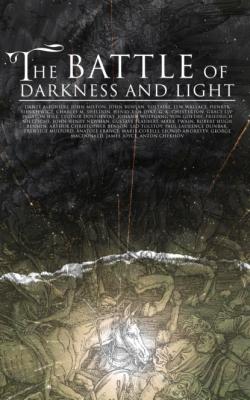ТОП просматриваемых книг сайта:
The Battle of Darkness and Light . Джон Мильтон
Читать онлайн.Название The Battle of Darkness and Light
Год выпуска 0
isbn 4064066499112
Автор произведения Джон Мильтон
Жанр Языкознание
Издательство Bookwire
Curio, who in speaking was so bold!
And one, who both his hands dissevered had,
The stumps uplifting through the murky air,
So that the blood made horrible his face,
Cried out: "Thou shalt remember Mosca also,
Who said, alas! 'A thing done has an end!'
Which was an ill seed for the Tuscan people."
"And death unto thy race," thereto I added;
Whence he, accumulating woe on woe,
Departed, like a person sad and crazed.
But I remained to look upon the crowd;
And saw a thing which I should be afraid,
Without some further proof, even to recount,
If it were not that conscience reassures me,
That good companion which emboldens man
Beneath the hauberk of its feeling pure.
I truly saw, and still I seem to see it,
A trunk without a head walk in like manner
As walked the others of the mournful herd.
And by the hair it held the head dissevered,
Hung from the hand in fashion of a lantern,
And that upon us gazed and said: "O me!"
It of itself made to itself a lamp,
And they were two in one, and one in two;
How that can be, He knows who so ordains it.
When it was come close to the bridge's foot,
It lifted high its arm with all the head,
To bring more closely unto us its words,
Which were: "Behold now the sore penalty,
Thou, who dost breathing go the dead beholding;
Behold if any be as great as this.
And so that thou may carry news of me,
Know that Bertram de Born am I, the same
Who gave to the Young King the evil comfort.
I made the father and the son rebellious;
Achitophel not more with Absalom
And David did with his accursed goadings.
Because I parted persons so united,
Parted do I now bear my brain, alas!
From its beginning, which is in this trunk.
Thus is observed in me the counterpoise."
Canto XXIX. Geri del Bello. The Tenth Bolgia: Alchemists. Griffolino d' Arezzo and Capocchino.
The many people and the divers wounds
These eyes of mine had so inebriated,
That they were wishful to stand still and weep;
But said Virgilius: "What dost thou still gaze at?
Why is thy sight still riveted down there
Among the mournful, mutilated shades?
Thou hast not done so at the other Bolge;
Consider, if to count them thou believest,
That two-and-twenty miles the valley winds,
And now the moon is underneath our feet;
Henceforth the time allotted us is brief,
And more is to be seen than what thou seest."
"If thou hadst," I made answer thereupon,
"Attended to the cause for which I looked,
Perhaps a longer stay thou wouldst have pardoned."
Meanwhile my Guide departed, and behind him
I went, already making my reply,
And superadding: "In that cavern where
I held mine eyes with such attention fixed,
I think a spirit of my blood laments
The sin which down below there costs so much."
Then said the Master: "Be no longer broken
Thy thought from this time forward upon him;
Attend elsewhere, and there let him remain;
For him I saw below the little bridge,
Pointing at thee, and threatening with his finger
Fiercely, and heard him called Geri del Bello.
So wholly at that time wast thou impeded
By him who formerly held Altaforte,
Thou didst not look that way; so he departed."
"O my Conductor, his own violent death,
Which is not yet avenged for him," I said,
"By any who is sharer in the shame,
Made him disdainful; whence he went away,
As I imagine, without speaking to me,
And thereby made me pity him the more."
Thus did we speak as far as the first place
Upon the crag, which the next valley shows
Down to the bottom, if there were more light.
When we were now right over the last cloister
Of Malebolge, so that its lay-brothers
Could manifest themselves unto our sight,
Divers lamentings pierced me through and through,
Which with compassion had their arrows barbed,
Whereat mine ears I covered with my hands.
What pain would be, if from the hospitals
Of Valdichiana, 'twixt July and September,
And of Maremma and Sardinia
All the diseases in one moat were gathered,
Such was it here, and such a stench came from it
As from putrescent limbs is wont to issue.
We had descended on the furthest bank
From the long crag, upon the left hand still,
And then more vivid was my power of sight
Down tow'rds the bottom, where the ministress
Of the high Lord, Justice infallible,
Punishes forgers, which she here records.
I do not think a sadder sight to see
Was in Aegina the whole people sick,
(When was the air so full of pestilence,
The animals, down to the little worm,
All fell, and afterwards the ancient people,
According as the poets have affirmed,
Were from the seed of ants restored again,)
Than was it to behold through that dark valley
The spirits languishing in divers heaps.
This on the belly, that upon the back
One of the other lay, and others crawling
Shifted themselves along the dismal road.
We

